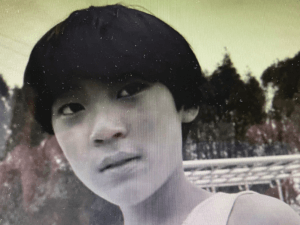Streamable
STATION ELEVEN, A No-Spoiler Review
Last week, a few members of my family watched all ten episodes of STATION ELEVEN. This HBO Max miniseries is based on a novel by Canadian author, Emily St. John Mandel.
As a dystopian story, this series pleased all of us, different generations and genders. I rate it PG or PG13. The topic is challenging, but the people in STATION ELEVEN are not vile or overly violent…not much gore or explicit sexual content to worry parents…however, the subject matter is sophisticated, a web of relationships. It’s family-friendly with mature teens and if your kid is a drama-geek, they will LOVE this show.
First, My Short Review: 6 Reasons I recommend STATION ELEVEN
- The storyteller uses a familiar trope, a world destroyed by a deadly and contagious flu, but delivers an unexpected cast of characters, as well as a post apocalyptic vision of hope
- The angle on “life-after-the-fall-of-civilization” captures something both historic and literary in how human beings find meaning in the broken world they inhabit
- The characters shine and fail, change and surprise
- A fun cast as ethnically diverse as it comes, and without stereotyping
- The city of Chicago or the wilds around Lake Michigan are featured in just about every episode…and that felt refreshing. Granted, I now live in the Upper Midwest, but new settings other than NY and LA are a welcome television treat
- STATION ELEVEN is self contained as a miniseries. Watch all 10 episodes and you have a complete experience…I like that.
The Longer Review
STATION ELEVEN, the miniseries, is based on a novel I have not read. One scifi-reader friend told me he found that novel difficult to “get into” as a book. He felt impatient with it, complaining how it took too long to get to the dystopian world scenario. He was bored by all of the setup and character development that took place before the prime action. That feedback makes me curious to read the novel and then analyze how Peter Sommerville’s screenplay adaptation made adjustments because I did not feel this while watching STATION ELEVEN. The first episode features the unraveling of the world and the tensions inherent in societal breakdown. It focuses on two main characters: Kirsten and Jeeven, a young actress and the man who winds up becoming her caretaker. The subsequent episodes put forward backstory that help build the world and the complex web of relationships. But…I cannot say that the initial story in episode 1 bored me in any way.
Following a traumatic event at a Chicago theater performance of King Lear, Jeeven (an audience member at the theater) is warned by his sister, a doctor on the front lines of the flu pandemic, to get to a market, buy food and make his way to their brother’s high rise apartment. Kirsten, who is a young actress in the play, tags along with him. Jeeven tries to take her home but is unable to locate her parents, so he takes her with him to a market and buys six grocery carts full of food. Together, they push those carts to Frank’s apartment complex, load them on the utility elevator and end up safe with Frank (for a while) as the rest of society crumbles around them. Technology fails, little by little, including their electricity. There is little contact with the outside world. Kirsten entertains herself by disappearing into the world of a graphic novel called Station Eleven. She begins to write a play based on the novel…a book written by Miranda Carroll (Danielle Deadwyler) the ex-wife of Kirsten’s acting mentor, Arthur Leander (played by Gael García Bernal). Leander is a key character in the threads of this story, despite the fact that he is one who collapses and dies on stage while playing Lear in the first minutes of the series.
Jeeven, Frank and Kirsten do not fall to the flu. They stay safe and relatively well-fed in the apartment despite freezing temperatures. However, their haven doesn’t last forever and eventually, the author exploits this trope; the survivors must leave their haven and brave the outside world.
In this next section of the story, Kirsten finds her way to a shakespearean acting troupe. They become her new family. The drama troupe travels around Lake Michigan in the warmer months, performing among other plays, Hamlet. This is one of the surprising twists in the post-pandemic dystopia, to put forward the idea that the arts will continue and be celebrated by many despite how raw life has become for survivors. You will have to watch to find out what happens to Jeeven and Frank. The two brothers are wonderful characters…memorable and complicated.
There is another storyline that enters the series at this point, still somewhat connected relationally and geographically. It’s a surprise, but not an unwelcome one and adds to much of the backstory. Still, the audience does not know how this new storyline will connect to Kirsten’s. It does and it did not disappoint me.
What is woven through STATION ELEVEN is how the connective tissue of our friendships and relationships emerge even in a time of trauma and loss. The storyteller takes us to a place that might seem contrived, yet captures a potential truth, reminding the audience that connections matter and that the truths underlying relationships, like those put on the stage by William Shakespeare, are universal and relevant (especially relevant) to the human experience post pandemic.
SPACE SWEEPERS, A No Spoiler Review

5 Reason to Watch Space Sweepers, The Short Review
- characters, they’re funny, quirky and smart…They reminded me of many beloved STAR WARS characters
- Special effects, on par with cinematic space opera’s like Star Wars
- Family friendly, nothing offensive for parents trying to figure out what to show their kids
- Excellent space battles
- An ultimate choice for the main character(s) that packs an emotional punch
 The Longer Review
The Longer Review
This film assumes a space opera vibe and so reminded me of Star Wars, yet felt original. The pacing of this screenplay gave exactly the right amount of info while embedding a few nuggets that made me go back a rewatch portions. That was rewarding and I loved the heartbeat of the story’s core…the transformation of a rogue…think of Han Solo and his journey.
Not that this story only bleeds a happy ending. There is a tragic trade that takes place, a brutal choice for the main character. However, the overall adventure ranked above my expectations. When I’m streaming something online like this, I’m not expecting brilliance, but when it’s Korean made, I am coming to expect top-notch production. The Korean film industry is doing something right by focusing on great storytelling and upping the game at every turn when it comes to investing in the visual feast. SPACE SWEEPERS is no exception.

I will continue to seek out, watch and review Korean-produced scifi/horror/speculative fiction because in the last 2 years or more, the flow of great content is undeniable. For more Korean-productions that I’ve reviewed, see:
KINGDOM, A Review of a Korean-Made Masterpiece
SQUID GAME, A Review without Spoilers
TRAIN TO BUSAN, A No Spoiler Review
SQUID GAME, A Review without Spoilers
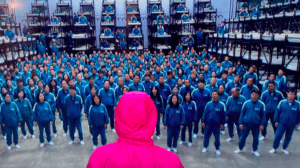
I had barely heard of SQUID GAME until about a week ago, but now the buzz is everywhere. If you’re like me, you’re wondering…Why all the hype about this Korean dystopian series?
So, last night, I watched the 1st of the 9 episodes and love what is being set up. This episode features a giant robotic girl that rules over a game of Red Light Green Light, also the episode’s title.
Here’s what I can say about the opening.
- An introduction to a variety of well-drawn characters
- Especially, the main character, Seong Gi-hun played by Lee Jung-Jae, is a sympathetic hero, a financially desperate divorcee with a gambling problem living with his mother
- The story draws together hundreds of below average types or “losers” to compete with one another for an extraordinary financial prize. (Losers is the word used by the creator and he makes great pains to show the audience his characters’ failings).
- A creepy robot child with roving eyes that shoot bullets. Tis the stuff of nightmares.
SQUID GAMES would probably receive a PG-13 or maybe even an R rating for violence. I am watching the dubbed version. The dubbing hasn’t bothered me.
Update: After watching all of it, this series receives an R rating for sure and I don’t think it appropriate for teens. I don’t think the educational value is worth forcing a group to watch this. Many would not be able to tolerate the violence.
There is a dystopian flavor to the story and the world, but its reality is not so hard to believe. What I mean by that is that the game world is not fantastical, nor is it futuristic. This game could be happening today on an island somewhere. The audience does get a shot of the island in episode 1, as well as the back of the billionaire maniacal overlord, who watches via screen as the contestants compete and try to stay alive.
Creator, Hwang, worked for ten years to get SQUID GAME made. The traditional studios wouldn’t touch it, but alternative streaming is proving again, that fresh stories are out there, often outside the Hollywood bubble. Cheers to Netflix in particular for curating and promoting dramas and comedies we would never otherwise see.
Click on the links below for more of my reviews of “outside the Hollywood bubble” stories that deliver. The first two are also Korean-made
KINGDOM, A Review of a Korean-Made Masterpiece
TRAIN TO BUSAN, A No Spoiler Review
Don’t Miss the German-made Television Series, DARK. My No Spoiler Review
FOUNDATION, A No Spoiler Reveiw of the first 2 Episodes

Why unthinkable? The Foundation Series, which began as a few short stories, but over the course of Asimov’s life, evolved into something much more vast, portraying the slow downward spiral of an empire in a sprawling universe over many centuries.
Apple, having bought the rights to the Foundation Series in 2019, invested a large sum to make this happen. The story is definitely being tweaked by Goyer and Friedman, but I am appreciating the adjustments because the Foundation Series novels did not appeal to me. Too many supposedly smart dudes sitting in rooms and talking at one another. Too many ideas delivered in a way that felt preachy to me, therefore dull. Characters that felt interchangeable and almost zero females.
But how about the series? So far I am loving what is evolving on screen. If you’re a scifi fan, here’s why I think it’s worth watching.
- The core of Asimov’s ideas are all there, the story well told so far
- The production design, the sets and costumes are fabulous
- The acting has been surprisingly good
- The screenwriters have changed some of the male characters to female, including Gaal Dornick, the lead character in these first 2 episodes. Dornick, pictured below, is played by Spanish actor, Lou Llobell.

For educators, the idea of eternal rule (by cloning) raises interesting ethical questions, like: How will science and technology impact the governing of humanity?
The third episode drops this Friday, October 1st.
TRAIN TO BUSAN, A No Spoiler Review
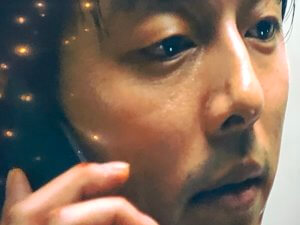
TRAIN TO BUSAN, set in Korea, is subtitled for English (and other language) speakers. This film was written for the screen by Sang-Ho Yeon and Joo-Suk Park and directed by Yeon. The film would probably receive a PG-13 rating for gore, the zombie kind, nothing worse that what you might see on AMC’s The Walking Dead. You can view this film for free if you are an Amazon Prime member. I loved it. In fact, I think the writing is brilliant.
Click here for the film’s trailer.
 Short Review. Five reasons I highly recommend TRAIN TO BUSAN
Short Review. Five reasons I highly recommend TRAIN TO BUSAN
- Perfect writing/storytelling, including the pacing that ramps up quickly at about 10 minutes in
- Sympathetic characters. The father/daughter story at the heart puts this zombie flick in a category above most others
- Another fresh setting. By now, if you’ve read a few of my reviews, you know I am an advocate of consuming stories told outside of the Hollywood bubble
- Once the action starts, it doesn’t stop and much of it takes place in the close confines of a train or a train station
- A pitch-perfect ending
Longer Review
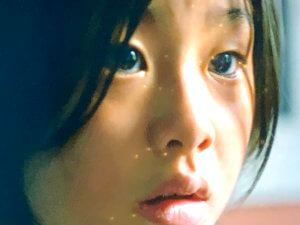
Seok-woo, a divorced father of one 10yo (or so) daughter, Soo-an, is a fund manager who works long hours. While he works, his mother cares for his daughter. They are based in Seoul, Korea. On the day the audience meets this family (the first minutes of the film), Soo-an is anticipating her birthday on the following day. She longs to be with her mother on her birthday. The problem, her mother lives in Busan, so Seok-woo must decide if he will accompany his daughter to Busan during a time when he is overwhelmed with work. He decides he will. In the first minutes, the audience has learned he has NOT been the most attentive father due to his demanding job. Is it guilt or something else that urges him to make this decision?
The decision is a sacrifice from his perspective, though he assumes he will be able to go very early in the morning, deposit his daughter in Busan and still return to Seoul to work a half day. The train trip (normally) is about 3 hours.
However, as they embark on the journey, a few unusual situations emerge, scenes the audience anticipates and knows are signs of something gone wrong.
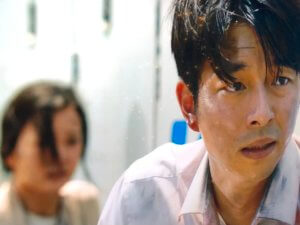
The rest of the narrative is not a simple zombie story. Seok-woo must fight and learn to sacrifice, not just for his daughter, but for others. While he journeys, he will have many teachers, including his daughter. Amid all the stress, he grows and changes.
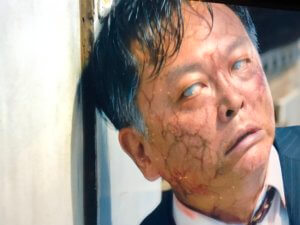
EQUILIBRIUM, A No Spoiler Review
During COVID, I have been watching older science fiction films, whose theatrical release I might have missed. EQUILIBRIUM falls into that category. Written and directed by Kurt Wimmer, starring Christian Bale, Sean Bean, Taye Diggs and Emily Watson, this film is rated R for violence, released in 2002. You can rent it as an Amazon Prime member for 4 dollars.
I recommend this film. It’s not the most thoughtful science fiction around, but it was entertaining on a few levels.
Short Review, 4 Reasons to watch
- Christian Bale gives a nice performance
- The one idea that drives the plot does create tension and makes the audience think at least a little…(see longer review)
- Stylized fight scenes–if you like martial arts/Matrix type battles
- Tight, linear story…easy to follow (given I just watched Tenet in the theater, it’s nice to watch a film that is relatively straightforward)
Longer Review
Earth exists in a dystopian reality, post WWIII, led by a man the population calls Father, though the ruling powers are likely something broader than one man. These decision makers have determined that Earth will not make it through another world war and have created a rigid society for the sake of survival. Emotion is outlawed, so are all things associated with emotion, in the film’s case: art, music, nostalgia items, love/affection, sensual pleasure, pets. The ruling class gives the population a drug to dampen emotions. Most faithfully take their doses a few times a day, including Bale’s character, John Preston. Preston is called a cleric, which the audience learns is a highly trained enforcer of the government’s anti-emotion policy. He roots out the rebels and those who indulge in art of all types.
The incident that brings upheaval into Preston’s life is when his partner Partridge, played by Sean Bean, steals a poetry book they had confiscated. Preston confronts him when he catches Partridge reading Yeats for his own pleasure. He is sentenced to death, but not before he reads a few lines of poetry out loud. Soon after, Preston discovers Patridge’s lover, played by Emily Watson. When he realizes that his former partner had gone down this road toward emotions, even falling in love…it seems, he cannot go back….something in him is triggered.
The unraveling continues as Preston dreams and recalls his wife’s conviction and execution. She was caught “feeling” outside the bounds of what the society permitted. His son is a rigid rule keeper, but his daughter is obviously more emotional and possibly disturbed (who wouldn’t be in this world?). Preston stops taking the drug and begins to truly feel a lot more. His new partner, Brandt, played by Taye Diggs, begins to notice his odd behavior. In the meantime, the rebels begin to recruit Preston. They want him to kill Father.
There is a strange interaction between Preston and the leader of the rebels where the leader makes sure that Preston cannot allow himself to feel if he is going to do the job he needs to do. The leader also indicates that he himself buried his feelings. That raises an interesting question about feelings and soldiers who are called upon by society to perform a “justified” killing. The audience can see in this a reflection of Father’s maintenance of the population…Father has told his followers that they must not feel in order to perform righteously. I think the audience is supposed to ponder this and reflect on what it means to kill another human being (like killing the spirit of the person by outlawing art!), but the interaction does pass by pretty quickly and there is no further discussion on it. Moreover, many people die in this film, so if we’re supposed to feel horrible about murder/a crazy amount of killing…hmm…not sure.
There are almost zero female characters in EQUILIBRIUM, which begs the question…
Is a non-emotional world a place where women have a hard time existing? I suspect so, at least in this film world. All of the female characters who have significant screen time (which isn’t much) are in the rebel category. Even Mona Lisa cannot exist in this world. (Da Vinci’s masterpiece is destroyed in an early scene). I appreciated the Emily Watson character, but she is one among six guys who dominate every scene. I realize a lot of folks don’t care about this issue…but I like to contemplate…Does it have to be this way? Would this film say something deeper and broader about humanity if one of the hardcore cleric characters was a woman? Or maybe the filmmaker was showing us what a world might look like without women, without mothering, nurturing and emotional connection…and maybe without them…art could not exist. That is an interesting idea, but I don’t think this film quite got us there.
Good science fiction does often grapple with the question, what does it mean to be human? The equilibrium sought out by the government in this film, is tentative and only possible because of the numbing of the population through a constant intake of a drug. EQUILIBRIUM portrays characters who will forego taking the drug, are willing to die and choose to sacrifice all for the sake of feeling. Art, poetry, music, love, affection and warmth in relationships…we cannot be human without them. We cannot live without them.
For that reason, I found EQUILIBRIUM a hopeful picture of humanity. Love, creativity and expression will burst forth. It cannot be contained. It can never be fully squelched and is a hopeless task of any government to try to do so.
KINGDOM, A Review of a Korean-Made Masterpiece

KINGDOM is brilliant.
Rated R for violence. No sexually explicit content at all. Not even a kiss. And yes, this is a zombie story, but with a twist, which I’ll explain in my longer review. However, be prepared for gore. I watched 2 seasons, but apparently a 3rd is being made to be released in early 2021.
First, the short review…
6 Reasons I Recommend KINGDOM
- Game of Thrones meets the Walking Dead. If the two stories got together and had a child, KINGDOM would be that child.
- Gorgeous costumes, especially the hats
- Palace intrigue galore
- Amazing performances by talented actors many of us have never seen
- A refreshingly different setting and world
- Lots of “scare” moments where you jump out of your seat. These filmmakers know the tropes and use them well.
 Now, for the longer review…
Now, for the longer review…
The story is based loosely on the Manga series, The Kingdom of the Gods by Kim Eun-hee and Yang Kyung-il. The story for television was written by Kim Eun-hee, directed by Kim Seong-hun.
Set in late 16th century Korea (The Joseon Period), Crown Prince Lee Chang, our protagonist, discovers a plot to unseat him. His father is ill and dying and the Queen Consort (not the Prince’s mother) is pregnant with a son…potentially. She and her father are angling for this newborn to take the throne. However, the King must not die from his illness before this child is born, so the the palace doctors are asked to keep him alive at all costs. There is an herb, called the resurrection plant, that must be administered to him in a particular way at death. From this herb, the brain comes back to life, but the creature that resides in the body now has an insatiable hunger for human flesh. Thus, the zombie angle.
The audience is introduced to this creature, the King in the first episode, so no spoilers here. The King is not only a zombie ready to devour any attendant who comes his way, he is being controlled, in chains, by the Queen’s family. She bans the Crowned Prince from seeing his father and although he suspects the King is dead, he cannot prove it. Knowing his life is in danger without his father’s protection, the Crowned Prince flees and while he goes into hiding, the zombie plague is carried to a small village through a body in a coffin, whose death was caused by the King creature.
As the Zombie plague spreads and begins to ravage the region, the Prince comes into his own, fighting to protect his people, but this is a complicated two-front war. The Prince is being chased by his step mother’s clan while fighting the zombie masses. While on the countryside, he slowly unravels the mystery surrounding the condition of his father and does eventually come back to the palace, face to face with the creature. I say no more, lest I spoil…

I loved the writing, all the dialogue is perfect and no scene is wasted. KINGDOM often reminded of Shakespeare, Hamlet in particular…That is how well put together these characters are and the stage is…well, many lovely locations in South Korea.
I cannot recommend this series highly enough. If you do watch it, drop me a line and let me know what you thought of it.
To watch the official trailer, click KINGDOM trailer
HANNA, A Review of Amazon Prime’s TV Series

I rate this series R, mostly for its violence. HANNA, created and written by David Farr, also portrays a disturbing picture of childhood, so if you have young children/teens who want to watch, you may want to preview this before allowing them to enter into the violent world of Hanna. Other than that, I highly recommend this series. It skirts the line that is science fiction and dystopian.
Short Review of HANNA. 6 Reasons You Want to Watch…
- Well written story and well-crafted characters
- Outstanding performances by Joel Kinnaman, Mireille Enos (they’re reunited here…having starred together in the award-winning detective series, The Killing.) Hanna is played by Esme Creed-Miles. She’s a British actor, but pulled off the German accent. I don’t think she actually speaks German, but she did speak French fluently. Kinnaman is Swedish. He also carried the German accent and spoke a lot of German to make this role believable.
- Timely. A US intelligence service, broken into factions, clawing at more power? Perhaps too real…
- Truth and morality emerge in the most unlikely places and the story reminds us of that.
- I love the way the characters rarely shout. Erik (Kinneman) and Hanna (Creed-Mills) both have this quality. They speak with intensity, but always quiet and measured, understated. I found myself loving this vibe more than I thought I would, maybe my Scandinavian roots…
- A story set in Europe, especially Berlin, London and Paris. Hurray, given we cannot travel there right now.
Longer Review
One of the things I liked about this production was its willingness to go slow. That might sound weird because the story moves at a pretty fast clip, but there is also time in each episode to absorb what is taking place in the character’s lives, in their hearts. I attribute part of that pacing to the editing. THANK YOU DIRECTORS AND EDITORS! It surprised me sometimes what was not put on the screen/what was skipped, but it also revealed what was most essential for the story. I found my brain willing to allow the holes in the plot because the true drama was not withheld from my view.
In season 1, the audience is introduced to Hanna as a baby, also to her mother and to her mother’s savior, Erik (Kinneman) who ends up rescuing Hanna from destruction. Erik, though German, is an insider with the US intelligence agency that is accepting babies in order to turn them into super assassins. Erik becomes Hanna’s guardian and the audience believes he might actually be her father. He isn’t. When Hanna finds out he has lied to her about his biological relationship to her, she is enraged.
Telling the truth is VERY important to Hanna. This seems consistent throughout and is refreshing as a character trait. It grounds the viewer, even when Hanna’s allegiance to the “good” or the “evil” entities in the world seems confusing. Hanna punishes those who lie to her, even when those individuals are her allies.
That dynamic of telling truth versus lying, or shrouding the truth reminds me of how teens (I’ve raised a couple and counseled many) have a nose for truth or fiction. They sense when adults are lying to them. Just tell me the damn truth and don’t protect me from it because you think I can’t handle it said every teen ever.
And I love that about them. I loved that about Hanna. She is so pure in that sense, the audience is ready to root for her in just about any circumstance, even when it feels like she is about to give in to evil.
Hanna has been renewed for a third season. I look forward to seeing how the writers develop this story.
THE MAN IN THE HIGH CASTLE, A No Spoiler Review of the Amazon Prime TV Series

THE MAN IN THE HIGH CASTLE is not a new story, but it was imagined anew by creator Frank Spotnitz for our era. It is based on Philip K. Dick’s novel of the same name (which I have not yet read, but will soon because I enjoyed the series so much). Dick’s daughter was involved in the production of the tv version, overseeing her father’s vision.
This story is less science fiction in the traditional sense and more alternative history. Dick wrote THE MAN IN THE HIGH CASTLE after being inspired by the novel Bring the Jubilee, by Ward Moore, whose novel is an alternative history of the US where the Confederate States win the Civil War. In Dick’s novel, the Axis powers win World War II. First, the short review:
5 Reasons I Recommend THE MAN IN HIGH CASTLE

- Superb storytelling…I was surprised at how well the writer(s) kept me engaged, including the pacing over 4 seasons. Bravo!
- Spot-on performances. A brilliant portrayal of John Smith, an American/Nazi leader, by Rufus Sewell. Also, a powerful female hero in Juliana Crain (Alexa Davalos)
- A satisfying enough ending (will say no more lest I spoil)
- Pushing characters to their limits and not turning away from human dilemmas like: How far would you go to protect your family? Would you kill a person in cold blood if you know they will be responsible for death and mayhem in the future?
- Finally, if you find history a bore, consider jump-starting your learning via consuming smart fiction, like THE MAN IN THE HIGH CASTLE. World War II was a fascinating and dark time in world history with reverberations reaching into our current era, more than we might think. THE MAN IN THE HIGH CASTLE gives the audience an intimate view into the characters of the day, many of whom are real historical people, but if not real, the fictional characters help the audience understand the zeitgeist of the time.
Longer Review…

In that sense, I found the series remarkably relevant. Dick is playing with alternative histories in this story and Spotnitz (credit for the screenplay/creator goes alone to Frank Spotnitz on the show’s Wikipedia page) was able to put forward a world that in many respects, felt as real as the news I see on my screen on any given day. Before Covid19 and George Floyd protests…in this series (in the book, I assume as well) memorials, monuments and statues are blown up, taken down, destroyed. That was interesting for me to ponder.
In THE MAN IN THE HIGH CASTLE, those taking down the monuments are Nazis, determined to wipe out American history and recreate their own version of history that will be imposed on Americans. One character spells out the reason, “Once we wipe out their narrative, it will help them accept our narrative, the Nazi narrative.” The Nazis empower the young people in the US to riot and do violence to any who try to protect the monuments.
I would hesitate to make a moral statement about those who have defaced monuments in our cities in these last months, but I did find it fascinating to see this portrayal, non political, I assume because the screenplay was written long before our recent protests. How would those scenes be written today? I wonder…
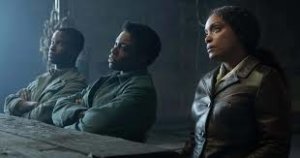
THE MAN IN THE HIGH CASTLE does not justify white supremacy. It tries, I think, to highlight its evil and does not let white America off the hook. Like I said…this is a complex narrative and, to give Dick credit, it was written in the early 1960s.
In the series, the Axis powers have split the US into three zones. The Japanese rule that which is West of Rockies. The East is ruled by the Nazis and in an attempt to keep these powers from eating each other, the middle of the US is neutral. Juliana Crain is a San Francisco native, so plenty of Northern California sites on screen, including the supremely gorgeous Japanese Tea Garden in Golden Gate Park.

Grit, hope, despair and horrible evil are all captured in this story, but what emerges most prominently in narrative are deep truths about what is right, just and good. This story is one for our time. I encourage you to start watching today.
DARK/WEB, Chapter 8 A Final Review with a Few Minor Spoilers
My 8th post on this particular Amazon Prime series. I reviewed chapter by chapter (episodes are called chapters). For a review of the pilot, click Chapter 1.
Today I viewed the finale.
Question that arose…Will DARK/WEB will have a second season? Will there be enough interest? I have no way of knowing. What I can say is this…
There is a kind of resolution that takes place in this final chapter.
- Molly is found
- The mystery of what she was up to and why she was drawing her friends toward her hiding place is solved
- There are a couple of big reveals…one of which doesn’t pack the emotional punch that it should
- A perhaps too tidy wrap-up
- More horror story tropes…like a corpse, a cabin in the woods, a stormy night without power
The ending to this series felt overly ambitious and contrived…a lot of explaining right at the end to tie up all of the loose ends. Sometimes the characters acted in a way that didn’t make sense to me, didn’t see human, but served the overall plot. I always get frustrated when this is the case. There is a campy nature to the series, maybe this is part of the fun…perhaps another horror trope? However, it also takes itself VERY seriously at times, so I was trying to take it seriously too and sometimes the camp did not match the tone of true evil that was being portrayed.
However, I will give the series lots of chops for these elements:
- An ambitious vision in its attempt to unveil evil in our society
- A diverse cast of characters, (diverse in ethnicity and sexual orientation)
- A female POC director. I loved the direction overall…I wasn’t wild about the all the writing, but hey…I am a writer and am always more picky about the writing than the directing.
Overall, I recommend DARK/WEB if you have the stomach to watch horror/scifi.



 The Longer Review
The Longer Review